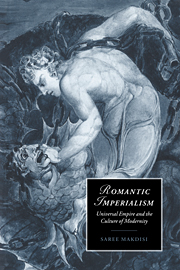Book contents
- Frontmatter
- Contents
- Preface and acknowledgments
- 1 Introduction: Universal Empire
- 2 Home imperial: Wordsworth's London and the spot of time
- 3 Wordsworth and the image of Nature
- 4 Waverley and the cultural politics of dispossession
- 5 Domesticating exoticism: transformations of Britain's Orient, 1785–1835
- 6 Beyond the realm of dreams: Byron, Shelley, and the East
- 7 William Blake and the Universal Empire
- 8 Conclusions
- Notes
- Bibliography
- Index
- CAMBRIDGE STUDIES IN ROMANTICISM
2 - Home imperial: Wordsworth's London and the spot of time
Published online by Cambridge University Press: 29 September 2009
- Frontmatter
- Contents
- Preface and acknowledgments
- 1 Introduction: Universal Empire
- 2 Home imperial: Wordsworth's London and the spot of time
- 3 Wordsworth and the image of Nature
- 4 Waverley and the cultural politics of dispossession
- 5 Domesticating exoticism: transformations of Britain's Orient, 1785–1835
- 6 Beyond the realm of dreams: Byron, Shelley, and the East
- 7 William Blake and the Universal Empire
- 8 Conclusions
- Notes
- Bibliography
- Index
- CAMBRIDGE STUDIES IN ROMANTICISM
Summary
“… London, that great cesspool into which all the loungers and idlers of Empire are irresistibly drawn …”
Arthur Conan Doyle, A Study in ScarletUniversal history was born in cities and reached maturity at the moment of the decisive victory of city over country.
Guy Debord, Society of the SpectacleThere are in our existence spots of time,
That with distinct pre-eminence retain
A renovating virtue, whence, depressed
By false opinion and contentious thought,
Or aught of heavier or more deadly weight,
In trivial occupations, and the round
Of ordinary intercourse, our minds
Are nourished and invisibly repaired;
A virtue, by which pleasure is enhanced,
That penetrates, enables us to mount,
When high, more high, and lifts us up when fallen.
William Wordsworth, The PreludePrior to his arrival in London in Book VII of The Prelude, Wordsworth tries to conjure up mental images of the city's various neighborhoods and districts (Vauxhall, Ranelagh, Westminster), as well as of specific buildings and tourist sights (St. Paul's, the Guildhall, the Tower). Once he is swept into London's streets, however, Wordsworth's preconceived spatial distinctions break down and dissolve, to be replaced by the flux of a ceaselessly-changing environment, one that never stops its self-transformations long enough to become a safely knowable, chartable, understandable place.
- Type
- Chapter
- Information
- Romantic ImperialismUniversal Empire and the Culture of Modernity, pp. 23 - 44Publisher: Cambridge University PressPrint publication year: 1998



